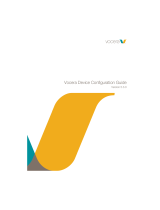
18 | System Messages ArubaOS 7.4 Syslog Messages | Reference Guide
300607 Activate Image Check Protocol Error [Error: %s]
Description: Activate module encountered protocol error with the Activate
Server.The error would indicate the possible cause.
300800 Central Internal Error:[Reason:%s] Athena Module encountered an Internal Error.
300802 Error encountered with Central Connection. Error: [Error: %s]
Description: Athena Agent could not establish connection to the Athena server. The
error string would indicate possible failure.
301003 Error, forwarding traps to the trap daemon.
Description: The system reported an error while trying to send an internal PAPI
message to the trap daemon for trap processing. As a result, a trap may not have been
reported to a trap receiver.
301010 Cannot bind to socket: [errno:%d]\n
Description: The system reported an error while initializing the SNMP process and it’s
unable to bind to the SNMP port. As a result, the SNMP process will be restarted.
301011 Can’t open the Boot File\n“
Description: At startup, the SNMP process could not open a file containing the SNMP
engine boots ID which is used for SNMPv3 user based security model. This is a fatal
error and the SNMP process will be restarted.
301012 Can’t open the Boot File for reading\n
Description: At startup, the SNMP process could not read a file containing the SNMP
engine boots ID which is used for SNMPv3 user based security model. This is a fatal
error and the SNMP process will be restarted.
301014 Invalid length. Encoding Failed: [file:%s]:[line:%d]
Description: The SNMP server failed to create an SNMP PDU used for SNMP response
due to an invalid data length. An SNMP response will not be generated.
301016 Error Building PDU [file:%s]:[line:%d]
Description: The SNMP server failed to create an SNMP PDU used for an SNMP
response. An SNMP response will not be generated.
301025 Error Adding [AddOID:%s] to the Varbind [file:%s]:[line:%d]
Description: The SNMP server failed to create an SNMP PDU used for an SNMP
response due to a failure in creating a var bind for the PDU response. An SNMP
response will not be generated.
301048 line:%d] Cannot Concatenate OID, [reason:%s]
Description: The SNMP server reported an error while creating a new OID from 2 OIDs
301050 SNMP PDU from [srcIP:%s] action [act:%s]
Description: The SNMP server reported an error while handling an SNMP PDU
301067 SNMP PDU from [srcIP:%s], parse VB failed, [reason:%s]
Description: The SNMP server reported an error while handling SNMP varbinds
301083 SNMP PDU from [srcIP:%s], parse octet string failed, [reason:%s]
Description: The SNMP server reported an error while handling an octet string varbind
301084 SNMP PDU from [srcIP:%s], Parse OID failed, [reason:%s]
Description: The SNMP server reported an error while handling an OID
Table 6 Error System Messages (Continued)
Error ID Message and Description




















